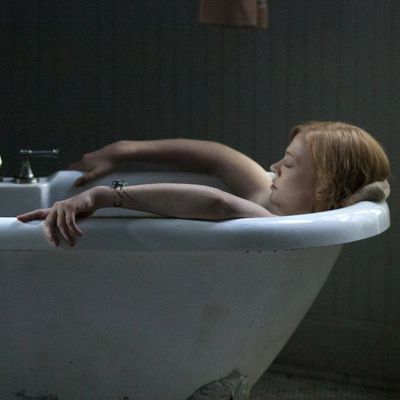
In the happy opening scenes of Jessabelle, a happy young woman, Jessie (Sarah Snook), happily gets into a car with her happy boyfriend as they happily prepare to move in together ÔÇö right before a truck plows into their car, instantly killing him and sending her to the hospital. ItÔÇÖs the last nice thing that happens to anyone in this lonely little horror flick, and its distant memory haunts the rest of this melancholy story.
Confined to a wheelchair (she has several more months before she can walk again), Jessie is brought by her once-estranged father back to her childhood Louisiana home, a big, remote, empty villa along the bayou. Mom died long ago, and Dad is a gruff, unfriendly sort, prone to suspicion and secrecy. On the ground floor of the house, he pulls aside a shelf to reveal a door leading to a secret room. This, we learn, was JessabelleÔÇÖs motherÔÇÖs; unable to go upstairs, our disabled hero now has to stay in this heretofore hidden space.
Mom, too, was too ill to sleep upstairs: She had a brain tumor during pregnancy and refused therapy for fear of harming the life growing inside her. In that secret, super-creepy room, Jessie discovers some old VHS tapes her dying mom made for the girl to watch later: In them, Mom sits in front of the camera doing tarot readings about JessieÔÇÖs future. Unfortunately, the cards always seem to spell out some kind of terrible fate for the girl. In fact, they even suggest that said terrible fate may have already happened to her. Oh, and who is this other spectral figure who seems to haunt JessieÔÇÖs wheelchair when sheÔÇÖs not in it?
Helplessness is the engine that often drives horror, and for its first half or so, Jessabelle offers an excellent example of how. Our hero, stuck in a wheelchair inside a big, lonely house, doesnÔÇÖt have many people she can turn to or many places she can go. And the film is at its best when it stays inside that house, inside JessieÔÇÖs terrifyingly uncertain, limited world of dark shadows and creaking sounds. Characters in other films egg the demons on, walking into forbidding rooms, opening strange doors, entering pitch-black basements. That has its charm, of course, but the elemental horror of a mostly immobile person who has to wait for things to happen to her ÔǪ now,┬áthatÔÇÖs scary. ItÔÇÖs somewhat akin to torture porn, I suppose ÔÇö and director Kevin Greutert has directed a couple of Saw films and edited most of the others, so he understands how that genre works ÔÇö but the helplessness feels less manufactured here, purer. At least at first.
But Jessabelle canÔÇÖt keep that tension going. Eventually, it falls into a swamp of its own making, trying to tie up loose ends, elaborately explaining its hinted-at backstory, and working in a mostly unnecessary, often useless boyfriend character (an old flame of JessieÔÇÖs named Preston, played by Mark Webber), who seems to be there mostly to help the plot get out of dicey situations created by JessieÔÇÖs immobility. What fuels JessabelleÔÇÖs most effective chills are its sparseness and terseness, its willingness to keep us and its character in the dark, cold and alone. As the film racks up incidents and characters and explanations, the mystery dissipates. ItÔÇÖs a strange spectacle: a horror film that spends as much time dismantling suspense as it does building it.


